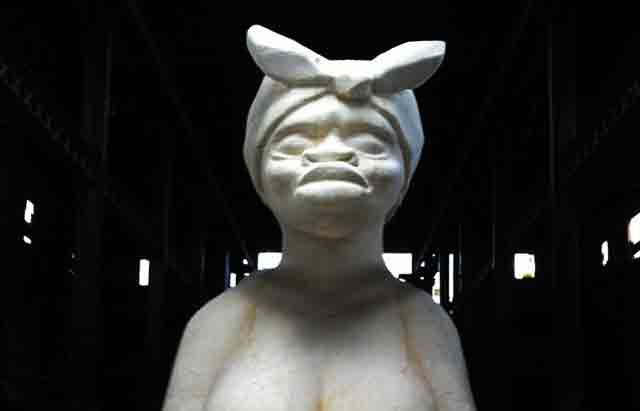Kara Walker’s first large-scale public project is currently on display at Brooklyn’s legendary Domino Sugar Factory. Walker’s installation is called "Subtlety" and features a gigantic figure with African features, posed to resemble a 35-foot sphinx encrusted with sugar and to receive your questions. The exhibition urges us to take into account sugar’s human cost.
The exhibition is presented in partnership with Creative Time, which also published this essay by Edwidge Danticat about Haitian workers on Dominican sugar plantations:
Recruited under false pretenses and sometimes trafficked from Haiti, many of these men and women (and children too) work in Dominican sugarcane villages, or bateyes, in conditions that barely differ from those of their 18th-century forebears. During the zafra, or cane harvest season, they work from sunrise to sunset, seven days a week. Yet they are barely able to pay for the food they eat. Some have their identity papers taken from them and fall into such bottomless debt that it becomes impossible for them to leave. Their children cannot go to school or learn a trade. Given the world’s insatiable appetite for sugar, this brutal cycle might well drag into the next century.
According to the U.S. Department of Agriculture, the United States imports more than 200,000 tons of sugar from the Dominican Republic each year. This makes the Dominican Republic the United States’ largest sugar partner among those countries–including Guatemala, Nicaragua and El Salvador–that signed the 2004 Dominican Republic-Central America Free Trade Agreement (CAFTA-DR). In September 2013, the U.S. Department of Labor issued a report on conditions in the bateyes that found evidence of "potential violations" of the CAFTA-DR agreement. The report cited child labor, forced labor (especially for those at risk of deportation) and deplorable living conditions, including a lack of sanitation facilities and potable water.
Recently the High Court of the Dominican Republic ruled that only those who have lived in the country since 1929 and have one Dominican parent are entitled to Dominican citizenship. This ruling, by most accounts, would render nearly half a million Dominicans of Haitian descent stateless.
